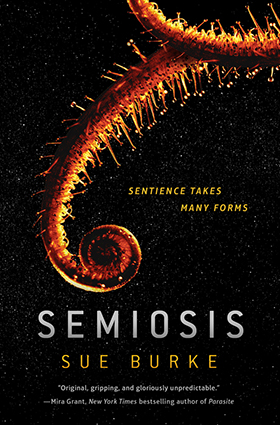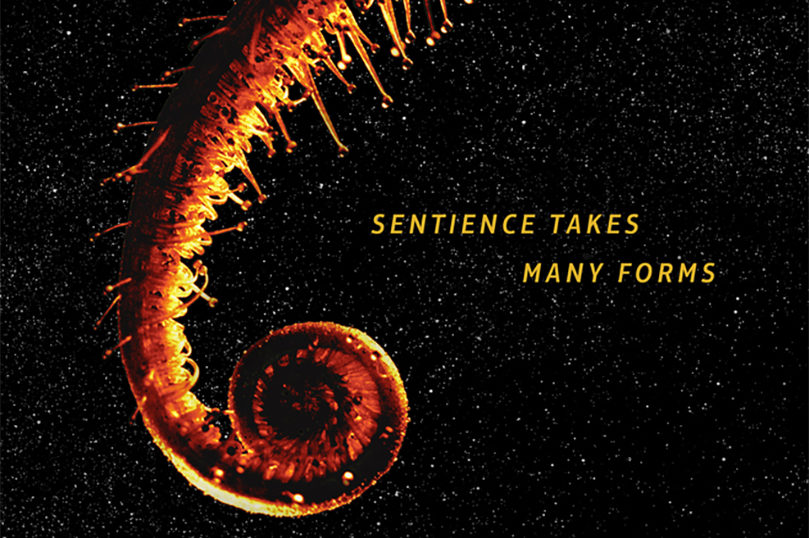opens in a new window By Sue Burke
By Sue Burke
Do your houseplants hate you? Want you dead? No, they don’t, no matter how much you neglect them. In fact, they’re praying to their green gods for your longevity. They’ll struggle on as best they can, offering you beauty and silent non-judgmental companionship in exchange—they hope—for more or less regular watering and a spot near sunlight.
Plants need you, no matter how inconstant you are. A lot of the vegetable kingdom depends on animals, in fact, and plants haven’t always chosen well.
Consider this story of apples and oranges—osage oranges, to be exact.
First, the apple: colorful and tasty. Many animals love sugary treats. Apple trees make sweet fruit for us to munch on so we’ll throw away the core, and the seeds can germinate in a new place. (They don’t trust us much, though. They’ve made their seeds too bitter to consume so we’ll do our job right.)
How has this strategy worked out?
Apples originated in central Asia, and ancient peoples brought them east and west. When apples reached North America, they found a champion named John Chapman, “Johnny Appleseed,” who brought orchards to the United States frontier. In the 20th century, with more human help, the trees conquered large portions of Washington State. Now, 63 million tons of apples are grown every year worldwide, much of them in northern China.
From the apples’ point of view, it doesn’t get better than this. They grow worldwide and get lots of tender loving care. Human beings have served them very well.
In contrast, there’s the osage orange tree. It also produces fruit: green, softball-sized, and lumpy, full of seeds and distasteful latex sap. No one eats it. The tree originated in North America and once grew widely, but by the time European settlers arrived, its territory had shrunk to the Red River basin in eastern Texas. How did it fail?
The fruit had appealed to the Pleistocene giant ground sloth, a member of North America’s long-lost megafauna. The sloth scarfed them down, not chewing much, and the seeds traveled safely through its digestive system, emerging in new territory. Then, 11,000 years ago, human beings came to North America and couldn’t resist the allure of a couple of tons of meat per slow-moving beast. Giant ground sloths disappeared, and six of the seven species of osage orange also went extinct.
Why haven’t the remaining trees adapted their fruit to contemporary tastes? Because trees live for a long time, and 11,000 years ago for them is like the High Middle Ages for us. Lucky for them, humans find their wood useful and rows of the trees effective windbreaks, so they currently grow across the United States and the world.
Still, useful wood isn’t much to offer the animal kingdom. Plants usually bribe us with food, the way that prairie grass entices grazers like bison to clear its domain of weeds. The bison nibble away weeds at the same time they munch on tasty grass leaves, which grass plants can easily replace. There used to be a lot more bison in North America, though. This strategy is starting to look shaky.
Flowering plants give bees nectar in exchange for hauling pollen from flower to flower, but bees seem to be having a rough time these days, too. If they go, both wild and domestic plants are in deep trouble.
Plants find animal partnerships tempting. We’ll work hard for a fairly low price. But we’re unreliable and short-lived as individuals—and too often as species.
Back to your houseplants. Many of them likely originated in tropical rainforests. Your living room resembles a jungle: warm, reasonably humid, and moderately lit. Growing in confinement there isn’t such a bad life.
You, on the other hand, are fragile, distractible, hyperactive, and a bit murderous of your own kind as well as other species. Have your houseplants fallen into good hands? Can apples rely on us, and for how long? Are osage oranges one more extinction away from their own disappearance?
Your houseplants suffer from existential angst. Food is love, and so is fleeting beauty. They give their all for you. Go water them, offer reassurance, and consider what you owe to plants. You—and other species—need to be there for them now and in the future. Make them happy. Survive.
Order Your Copy
opens in a new window opens in a new window
opens in a new window opens in a new window
opens in a new window opens in a new window
opens in a new window
opens in a new window
Follow Sue Burke online on Twitter, her website, and her blog.







What a cool hook! I really think this is something we don’t think about. Plants are alive, mine probably do hate me, although I do talk nice to them. I will be reading this one for sure. I am into the funny Doctor How series by Mark Speed and I LOVE it. I highly recommend it, it’s light and clever and we all need that now and then! For info his site is https://markspeed.co.uk/. It’s a great series!